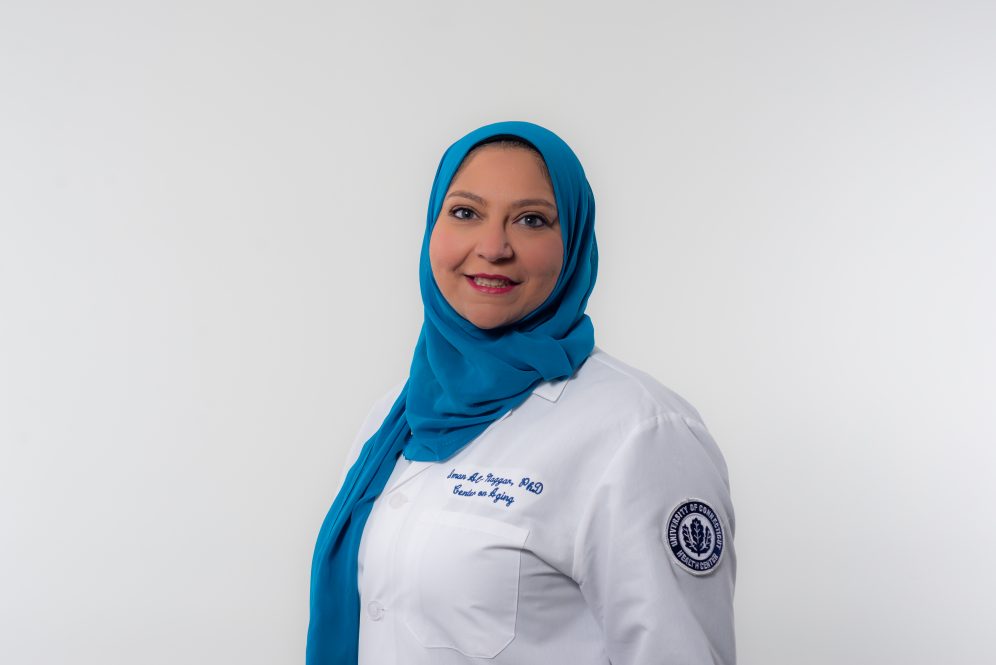The American Urological Association (AUA) and the Urology Care Foundation, the official foundation of the AUA, recognized 13 researchers as recipients of the 2023 Urology Care Foundation Research Scholar Awards. Research Scholar Awards support future research leaders and ensure they receive the necessary training and guidance for a successful research career.
Among these recipients, Dr. Iman Al-Naggar, assistant professor of cell biology and surgery, UConn Center on Aging at UConn Health has been awarded the AUA New England Section Wyland F. Leadbetter, MD Award. Al-Naggar will receive this two-year award for her project titled “Targeting aging pathways in lower urinary tract dysfunction” which will be under the mentorship of Dr. George Kuchel, director, UConn Center on Aging, chief, Geriatric Medicine, UConn Health and Dr. Peter Albertsen, chief and program director, Division of Urology, UConn Health.
These awards provide $40,000 annually for one or two-year mentored research training for clinical and postdoctoral fellows or early-career faculty. The program has invested over $25 million to support over 600 Research Scholars, most of whom have remained in committed research career tracks and now serve as leaders in urologic research and clinical practice.
“This is an incredibly exciting project since it seeks to test for the first time an entirely novel approach to treating highly bothersome lower urinary tract symptoms in older adults. Medications collectively called ‘anticholinergics’ are widely prescribed for this problem, yet they are often discontinued because of severe side effects. Instead, Dr Al-Naggar’s study, also supported by the UConn NIA Pepper Center represents a first effort to improve voiding problems by targeting the root problem at the level of biological aging,” says Kuchel.
According to Al-Naggar, this career development award will not only allow her to carry out this pilot and first of its kind human clinical trial testing a drug that targets biological mechanisms in common between aging and many aging related diseases (a “gerotherapeutic”), against lower urinary tract symptoms, but it will also provide her with both the didactic training and mentoring needed to make the leap from basic science research in animal models to human research participants.
“The Urology Care Foundation is dedicated to improving urologic health worldwide by supporting research, providing patient education materials, and promoting humanitarian initiatives,” said Harris M Nagler, MD, FACS, Urology Care Foundation President. “By providing support for researchers, we help develop individuals who will enhance our capacity to prevent, detect, and treat urologic diseases, thus advancing urologic health for everyone.”
“The American Urological Association (AUA) has been extraordinarily supportive of young investigators. They are the future of the organization and need help bringing new treatments to market,” said Albertsen. “I am so proud to see Dr. Al-Naggar continue the pioneering work that was started under Dr. Philip Smith. UConn continues to make important contributions to academic urology.”
“These foundation grants are essential to the success of early career investigators beginning their independent research careers such as myself because they enable the generation of pilot data essential for obtaining NIH funding in the form of larger Research grants. I am thrilled that the American Urological Association and UCF saw the exciting potential of this novel approach to the treatment of lower urinary tract dysfunction. I hope this will be the first of many studies I do and many drugs I test to bring a cure and relief to the millions of adults, most of whom are older adults, who suffer from these conditions that are extremely debilitating to their quality of life,” says Al-Naggar.
In her study, Al-Naggar will test whether MitoQ, a strong mitochondrial antioxidant that can target inflammation, mitochondrial dysfunction and endothelial dysfunction among other aging and disease pathways, can improve symptoms such as urinary urgency and frequency in women aged 50 to 75 with the metabolic syndrome. In addition to increasing the risk of diabetes and cardiovascular disease, the metabolic syndrome and aging are risk factors for lower urinary tract symptoms, suggesting shared biological mechanisms between all conditions. The study has received a green light to proceed from the FDA and is pending UConn Health IRB approval.



